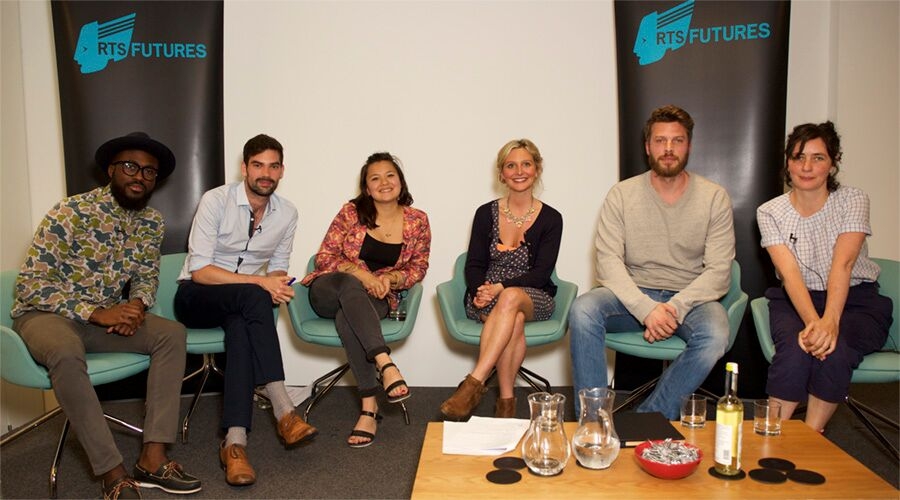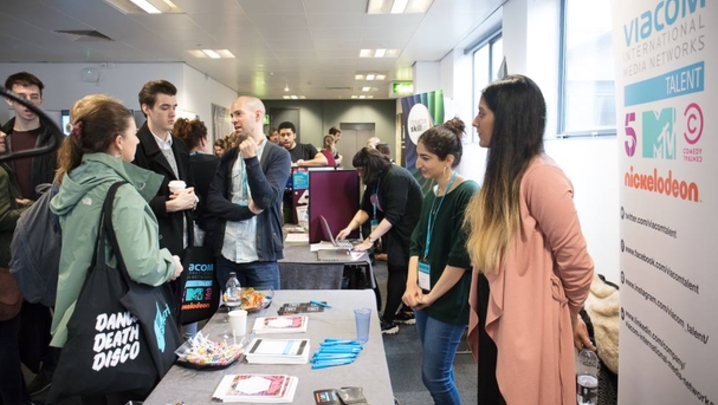Common sense, resourcefulness and enthusiasm are all essential skills for a job that is the lifeblood of TV, learns Matthew Bell
Without competent researchers, TV would be riddled with half-truths and even outright lies, the butt of viewers’ derision and the recipient of libel lawyers’ writs.
Helpfully, the latest RTS Futures event, "How to be the best... researcher", explained how the job should be done.
"Research is the life blood of the TV industry. Without research, we’d have no Big Brother, Gogglebox or Panorama," argued broadcaster and writer Rick Edwards, who chaired the June event.
In front of a large, youthful audience, the panel of three researchers and two company bosses discussed what it takes to be a researcher – "the best way to fast-track your TV career", according to Edwards.
The presenter of BBC Three topical debate show Free Speech had once worked as a researcher. "I definitely wasn’t the best, which is why I ended up taking a different direction. In fact, I was rubbish," he admitted.
Edwards recalled one traumatic experience, working on the short-lived Channel 4 breakfast show, Rise. Asked by his series producer to find quirky stories for the newspaper review section of the programme, Edwards came across a local paper article on the strange story of a man who had "married" a ladder.
"I chatted to him over the phone and he seemed OK. Obviously, he [claimed] he’d married a ladder, but I still thought [the interview] would be all right," said Edwards. When he turned up at the studio, "he was very heavily tattooed in a football hooligan way – basically, he was terrifying".
During the live interview, the man revealed he’d spent years in prison, which, of course, he hadn’t discussed with Edwards.
"It went from being a five-minute item to about one minute 10 seconds," Edwards recalled. "I knew that, as soon as the show was over, I was going to get bollocked. And, sure enough, I did get bollocked."
The best researchers, agreed the panel, need common sense, energy, enthusiasm, an ability to listen, resourcefulness and an eye for detail. And honesty.
"If you don’t know something, don’t try and blag it," advised Emily Hudson, Casting Executive at Studio Lambert, which makes Channel 4’s Gogglebox. "Be honest if you make a mistake."
"We don’t want people who think they know it all," said Producer/Director Victoria Bell, whose recent credits include the BBC Two documentary Traders: Millions by the Minute. Researchers should never be afraid to ask questions, she added: "There are some bad bosses out there – really nasty, shouty people. But [most] people working in telly are nice, clever, fun and interesting. They like being asked things, sharing their knowledge and nurturing talent."
The life of a researcher is seldom easy. "You will get the most random requests and think, ‘I’m never going to be able to do this.’ Your heart will flutter and you’ll think your TV career is over," said Hudson. "But you will [find a way to] do it."
Ben Ruby, a Senior Researcher on Sky One’s sports comedy panel show, A League of Their Own, recalled the time he was asked to find a kitten for a studio shoot. Within a few hours he’d met the legal and safety obligations of working with animals and, after phoning round animal shelters, landed a kitten – only to be told by the producer that the item had been dropped.
"It’s the nature of all television – if it doesn’t work out, don’t feel offended that your hard work has gone to waste. It will be noted that you put the effort in," he said.
Hudson and Bell had both found that a younger generation of researchers, wedded to the internet and social media, was reluctant to use the telephone or, indeed, talk to people at all.
Using the phone, said Bell, "is a challenge to begin with, but you’ll get better at it. You’re essentially a cold caller."
Internet sites such as Star Now advertise the talents of TV wannabes but, argued Hudson, they should only ever be a starting point. "Please pick up the phone – the worst people can do is to slam it down on you," she said.
"The first couple of research calls I made, I left the office to make them in the corridor," recalled Ayo Ajibewa, a researcher on BBC One consumer shows Rogue Traders and Watchdog. "I made the first call and the person was friendly and I realised I could do it."
"Generally, people like talking about themselves," added Selina Tso, a researcher on Wall to Wall’s ITV series Long Lost Family.
"Don’t ever be afraid to hear the word ‘no’," said Ruby. "Most of the time, people love to help, because they find the glitz and glamour of TV [irresistible]."
"You are a social chameleon. You have to work out how to relate to another person and find something you have in common," said Hudson.
Researchers tend to read the same newspapers and websites, so to find original material requires old-fashioned research – talking to people. "It’s from chatting to people that you get the most interesting and different ideas," added Hudson, "but it’s about the scariest thing you do when you become a researcher."
"You think, ‘Why should this person speak to me when I’m asking them the weirdest questions?’" said Tso. "My first show was [BBC Three’s] Websex: What’s the Harm? and I had to ask people really intimate questions."
Increasingly, the traditional skills of digging out information and people for shows are not enough – researchers now need technical skills if they are to get the best jobs. "Teams are so small now – it’s often just me and a researcher," explained Bell. "So having someone with the wherewithal to look after me technically while I’m shooting is indispensable."
Bell added that the ability to use a camera would enhance career progression. "There’s so much more work for self-shooters and there will be much more choice of programmes to work on," she said.
"It’s an invaluable skill to have, even if you don’t want to go on to become a producer/director," agreed Ajibewa, who had "pestered the production manager to send me on a shooting course".
He recalled the first time he was asked to use a camera – shooting a short piece with Olympic heptathlon gold medal winner Jessica Ennis – as "the most daunting thing of my life".
Ruby, who also has shooting skills, explained that there is more to using a camera than simply capturing good shots. "Sound is so important. It’s ridiculous the amount of stuff that comes back with poor sound, even though the shots are perfect. It’s unusable without good sound," he said.
"But," added Hudson, "please be upfront about your skills." She recalled sending one researcher, who had assured her that he had the requisite ability, out on his own to shoot. "The researcher returned with unusable footage and admitted that he’d never used a camera before."
‘How to be the best... researcher’ was an RTS Futures event, held at 110 Rochester Row in London, on 8 June
When it all goes pear shaped
All the panellists had experienced moments of panic or worse. At some point, said Selina Tso, ‘you’ll mess up – it will happen to all researchers and it [will seem] like the worst feeling you’ve ever felt’.
She advised: ‘Tell someone, because people will help you through it. Own up to [the mistake] quickly and don’t point fingers at other people.’ Tso’s howler was losing £500, although she later found it.
Victoria Bell recalled one incident where a researcher had been ‘too frightened to tell me, even though it wasn’t his fault’, that a location had cancelled the night before the shoot. The crew turned up to film and couldn’t. ‘He got himself into deeper and deeper water.’
Ayo Ajibewa remembered filming in Bristol and needing to get rushes back to London: ‘I arranged for a runner to meet me at the station and I passed them to him over the barriers. I was stopped by the British Transport Police who seemed to think that a drugs transaction had just gone down.’
Shoddy research can lead to embarrassment for presenters. Rick Edwards recounted a disastrous interview, fortunately not live, with the comic Gina Yashere. Trusting the biography he’d been given, which he admitted was an error, Edwards read his introduction off the autocue. Yashere responded: ‘No, that isn’t me – you’re thinking of another black comedian.’
‘She was probably thinking that this guy’s an idiot, and probably a racist idiot,’ he added.
How to get that first job
Victoria Bell: ‘Keep CVs short – one page for a researcher, unless you’ve got reams and reams of programme experience.’
Ben Ruby: ‘I used to get all my runner tasks out of the way and then pester the researchers, shadowingthem and asking if there was anything I could do... When I stepped up to be a researcher I already had the know-how.’
Ayo Ajibewa: ‘I was a runner first, too, and I used to constantly pitch ideas to producer/directors... They would give me a story and ask me about some of the context and suggestions about how to work on it. By the time I had become a researcher, it was the one thing that I knew I could do.’
Victoria Bell: ‘The reason that you [two] are researchers is that you’ve offered exactly what a producer/director – or anyone else in the team – is looking for. You’re making yourselves indispensable. When you spot a good runner doing the things these guys were doing, they always get promoted. That’s the way to do it: push, push, push. Get yourself in people’s faces without being a pain.’
The importance... of accuracy
Ben Ruby: ‘Read newspapers every day ... I read The Sun, The Daily Mail, The Guardian and BuzzFeed. Stories will stick in your head and when you need an idea you can return to them... I’m also a huge fan of [bulletin board news site] Reddit.... But don’t believe everything you read online – check if it’s correct.’
Selina Tso: ‘Never take information straight from Wikipedia – always check the sources.’
Ayo Ajibewa: ‘For the productions I work on, such as Rogue Traders, [the quality of the research] can be the difference between litigation and no litigation.’
Victoria Bell: ‘I’m not looking for regurgitated information... I’m looking for [researchers] to go a bit further and not give me information that I already know from a cursory glance.... It’s got to be right, as well.’
The importance... of looking off the beaten track
Ayo Ajibewa: ‘I look at plenty of blog forums and reviews
– there’s a lot of really strange people out there... I’m often looking for experts in weird subjects.’ Ben Ruby: ‘There is a blog or Facebook page for everything... you have to find those niche blogs that are buried somewhere deep in the web.’
Victoria Bell: ‘Once you find [a person from] that site, get on the phone.’
The importance... of being organised
Ben Ruby: ‘Be really organised – don’t write down contacts’ names on scraps of paper. Putting them in an Excel or Word file is invaluable for yourself and for anyone working on [the programme] afterwards.’




